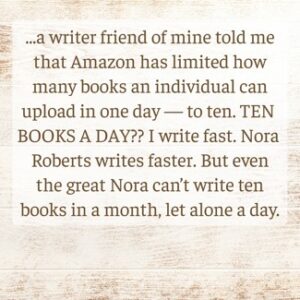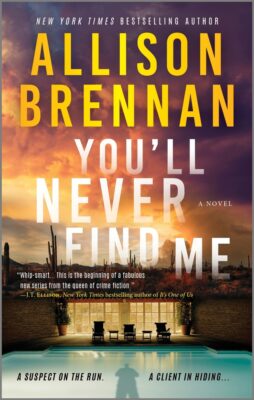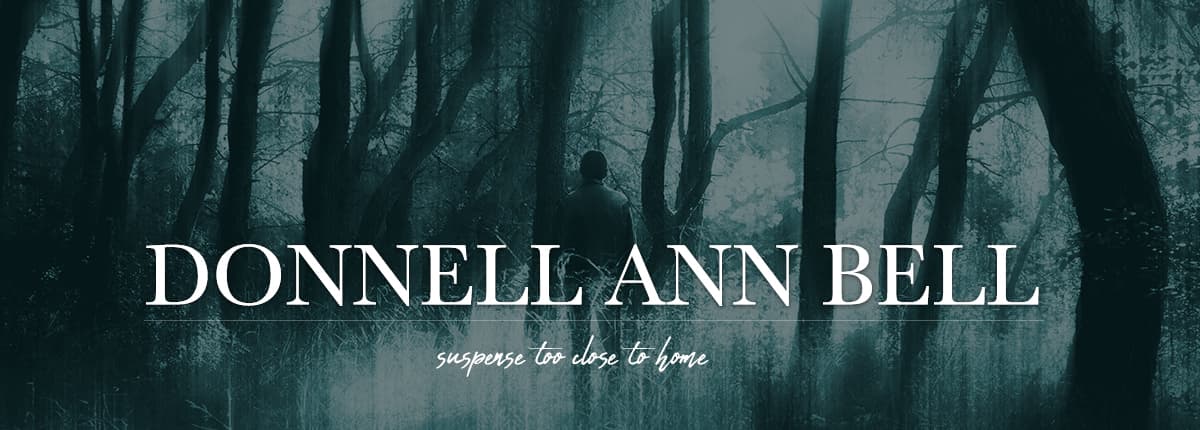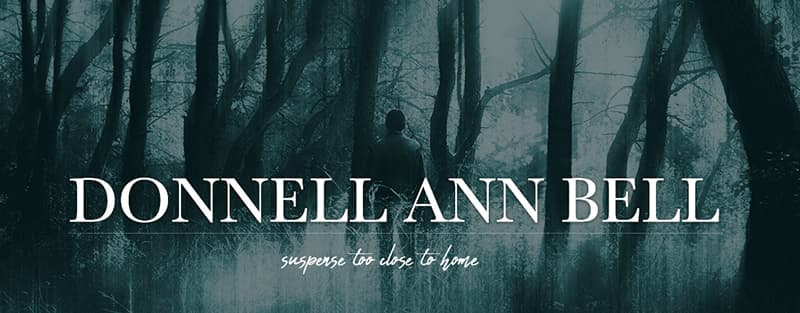By Allison Brennan:

Author Allison Brennan
I appreciate good stories well told. I also tend to be a cynical optimist, someone who generally sees the good in everyone, but can always figure out what bad things might happen. Maybe that’s why I love crime fiction — I love writing about everyday heroes like cops and PIs — and why I’ve always enjoyed reading and watching dystopian stories, especially in science fiction.
When Donnell asked me to blog about my thoughts on AI (artificial intelligence), my first thought was I didn’t want to. Nothing I say about AI, — pro or con — is going to impact the trajectory of AI in the world. But then, I reconsidered. I also tend to agree with Elon Musk:
“Mark my words … AI is far more dangerous than nukes.” ~ Elon Musk
I don’t understand why people haven’t learned from art that maybe there are some things we shouldn’t mess with. Haven’t they seen The Terminator where machines take over the world and kill three billion people? Haven’t they watched The Matrix where the birth of AI led to computers imprisoning humans in pods to run their digital world with our brain waves?
And seriously — War Games anyone?
 AI can be a powerful tool to help solve complex problems the world is facing. But AI, at its most powerful, could decide that humans beings — or some human beings — shouldn’t exist.
AI can be a powerful tool to help solve complex problems the world is facing. But AI, at its most powerful, could decide that humans beings — or some human beings — shouldn’t exist.
Come on, people! Thanos was, ultimately, a humanoid form of AI — a powerful being who decided that to save the universe, half the universe must die.
Ultimately, AI is only as moral as the people who program it. And as we’ve seen with the early AI chat programs, there is a distinct bias in programming. If AI learns from these early programmers, what will they extrapolate if they start thinking for themselves?
Science Fiction has been the primary genre that explored AI in the past, but AI and other technological advances has seeped into all other genres, particularly crime fiction.
Gregg Hurwitz writes the fabulous Orphan X series. In one of the books, a rogue group has used AI and drones to access all surveillance and technology — basically, if you show your face anywhere, they will find you. Yes, people created the program, but the drones learned from it and became their own hive mind. A brilliant and terrifying story.
I haven’t written about AI because while AI impacts everyone more or less, I can’t affect it.
Though I’ll admit it’s a bit disconcerting that when I talk to my daughter about a plot point in one of my books — like about cooking meth or how to pick a lock — I start getting ads for drug rehab and locksmiths.
On the big scale, I think we as a society need to be super cautious in how we bring AI into our lives. But how does AI affect authors and other artists?
Recently, we’ve heard a lot about AI writing books. In fact, a writer friend of mine told me that Amazon has limited how many books an individual can upload in one day — to ten. TEN BOOKS A DAY?? I write fast. Nora Roberts writes faster. But even the great Nora can’t write ten books in a month, let alone a day. Even if you’re writing a short novella of 25,000 words, you can’t write ten of them a day.
Before AI started writing books, there was already a glut of books on the market. This greatly impacts all authors, but especially self-published or new traditionally published authors. It’s harder to get noticed. It’s harder to stand out among millions of titles. Publishers have to work harder to have their books stand out as well. But with millions of books self-published a year, this is only going to get more difficult.
And as readers get burned with sub-par books, they will gravitate toward books that have been vetted by publishers, recommended by reviewers they trust, or written by authors they already know.
The big question to me is, can AI write books?
On the surface: yes. You can ask AI to write a book in the voice of Stephen King and get something that sort of sounds like Stephen King — likely because it was plagiarized from all of his works, which were used to “train” AI.
But one thing that AI can’t do is feel. All human emotions are fake — words that mean nothing in context because AI doesn’t know what love or loss feels like. AI doesn’t understand fear or joy. AI can’t feel a baby grow in a mother’s womb or understand the emotions of childbirth.
A good editor could take an AI written story and flesh it out with human emotion. And maybe readers won’t know. I think it’s cheating, and I think if a writer uses AI to craft all or part of his book, that there should be a disclaimer on it. But how would we know?
We can’t.
I think authors should publicly denounce AI in publishing, and I think that authors shouldn’t use AI in any capacity to write their books. Storytelling is an art created by humans for humans — and it should stay that way.
I’ve decided not to let AI trouble me too deeply because there is nothing I can do to stop it. However, buying property in the middle of nowhere and living off-the-grid is looking better and better.
As Stephen Hawking said more than two decades ago:
“Everything that civilization has to offer is a product of human intelligence; we cannot predict what we might achieve when this intelligence is magnified by the tools that AI may provide, but the eradication of war, disease, and poverty would be high on anyone’s list. Success in creating AI would be the biggest event in human history. Unfortunately, it might also be the last.”

About the Author: Allison Brennan is a New York Times and USA Today bestselling author of 45 books and numerous short stories. She lives in Arizona with her family and is enjoying time with her first grandchild. Her most recent book,You’ll Never Find Me, is the first in an all-new Phoenix set series about a family of private investigators.
About You’ll Never Find Me: Nothing brings family together like crime. In the first book in the thrilling new Angelhart series from New York Times bestselling author Allison Brennan, private investigator Margot Angelhart helps clients the law overlooks, but when she takes on a case more dangerous than she imagined, teaming up with her estranged siblings may be her only hope for survival.
Working alone as a private investigator is tough. Estranged from her PI family, Margo Angelhart does what she must to get by—including taking on sordid cases that pay the bills, even if she’d rather be helping those the justice system has failed.
That is, until a cheating husband case she’s working intersects with her siblings’ corporate espionage investigation, forcing Margo to cooperate with the Angelhart firm. Now, as the siblings compare notes, it’s clear they need to work together before a white-collar crime escalates to murder.
With far more questions than answers and a key suspect on the run, they’ll need the whole family to pitch in. But as they investigate the ever-twisting mystery, Margo isn’t sharing everything. Can she learn to trust her family and heal their once-close relationship before her secrets put those she loves most in danger?
Angelhart Investigations
Novella 0.5: Into the Fire
Book 1: You’ll Never Find Me
You can find Allison on her social media handles via her webpage, https://www.allisonbrennan.com











I’m glad I twisted your arm, A. When you move off the grid, be sure to leave your address 😉
Totally agree. Living off the grid is looking better and better.
Kinda scary, mostly because it makes so much sense. Thanks for this interesting discussion, Donnell.
Thank you, Pamela. I think Allison outlined her concerns very well.
AI kinda gives me the chills. Your book sounds enticing, Allison.
Sandy I’ve preordered. This is basically good versus evil. AI in the right hands can advance humanity. But that’s subjective. Who’s to say it’s in the right hands. I just know as a writer, even before AI came barrelling into our lives and IT platforms were racing to be ahead of the curve, I wrote my own books. I cannot stand the idea of plagiarizing another author. I don’t want help from AI.
Well said. Thanks for providing this perspective.
It was Ray Bradbury who said, “The purpose of science fiction is not to predict the future, but to warn about it.” The problem is, we now live in an age where it only takes a very small number of people to ignore the warnings for some very bad stuff to happen.
Thanks, Allison, for your thoughtful and on the mark article on AI. Invasive is my word for AI. When I open my computer, there is a message in blue in the right hand corner: AI themes available. A few days ago, I wrote a text to my granddaughter. I mis-typed a word, and hit what I thought was the icon for edit. To my shock, AI had rewritten my message! My feedback stated that I was smart enough to write my own damn texts, and I didn’t appreciate the AI crap. I know. that was like shoveling snow in a blizzard. But as a human being, I fear even living off grid in the middle of nowhere will only postpone the takeover.
Donnell, your blogs always give me ideas and thoughts to sharpen my intellect. Thanks!
Skip this scares me so much. What if I mistakenly push a button and AI contributes to my manuscript! Thoughtful post. Yes, I agree with you about the grid. Now if billions of us did it, maybe that would be more effective.